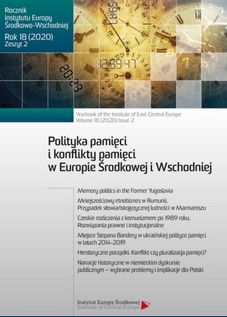Polityka historyczna Partii Akcji Demokratycznej w Bośni i Hercegowinie na przełomie XX i XXI wieku – zarys problemu
Historical policy of the Democratic Action Party in Bosnia and Herzegovina at the turn of the 20th and 21st centuries – outline of the problem
Author(s): Karol KujawaSubject(s): Military history, Political history, Government/Political systems, Political behavior, Transformation Period (1990 - 2010), Politics of History/Memory, Peace and Conflict Studies
Published by: Instytut Europy Środkowej
Keywords: Bosnia and Herzegovina; Muslims; political history;
Summary/Abstract: The aim of this paper is to make an overarching evaluation by looking at historical policy of the Party of Democratic Action (Stranka demokratske akcije, SDA) in Bosnia and Herzegowina at the turn of the 20th and 21st century and trying to (analytically) examine the main directions of this policy. Therefore paper will try to focus on the major historical figures and trying to analytically to indicate the reasons of the revival the Ottoman traditions in the public life of Bosnia and Herzegovina. Considering this issue I wonder what events and historical figures were promoted and which were censored by Bosnian politicians. What role in Bosnian historical politics was played by Srebrenica and the leader of Bosnian Muslims, Alija Izetbegović. The results of these studies indicate that it was primarily the conflict in Yugoslavia that contributed to the revival of Ottoman traditions among Bosnian Muslims. Only after the war did the historical policy gain institutional support and help the ruling party mobilize the electorate. Since then, the pillar of historical policy has become the martyrdom of the nation, the Ottoman past as well as the cult of the leader of Bosnian Muslims, Alija Izetbegović. Also, the authorities aimed to convince the inhabitants of Bosnia that in their lives the period of communist Yugoslavia brought many negative consequences. This pejorative image was supported in the mass media and education.
Journal: Rocznik Instytutu Europy Środkowo-Wschodniej
- Issue Year: 18/2020
- Issue No: 2
- Page Range: 85-101
- Page Count: 17
- Language: Polish

